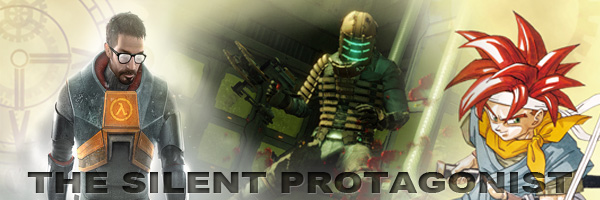
Today's games contain tons of terrifying situations: Aliens fire scorching bolts of plasma, hordes of zombies roam the streets in search of brains, and gargantuan beasts always crave a tasty snack.
Thankfully, many video-game protagonists seem to be made of sturdier stuff than I am. Their stoicism is beyond question because they never make so much as a peep about a hopeless battle or a horrifying enemy. Meanwhile, all of the characters around them lose their minds.
Years ago, the silent protagonist may have been a way to save a few bucks, but mostly, it was a method developers used to allow the player to pretend that they were the hero. Apparently, the idea behind this is that it puts the player in the main character's head and helps them to feel closer to the story.
Take Half-Life 2 for example: As long as Gordon Freeman doesn't share his thoughts or speak in a voice that doesn't match mine, I can fill his shoes. Since it's a two-way conversation, Alyx Vance is talking to me, right?
Of course not. The player and the characters suffer an awkward disconnect when they cannot interact. And isn't interaction exactly what gamers claim defines and separates the medium?

Sure, Valve leaves players in control of Gordon at all times, but most people end up jumping around the room to see if they can make it to Eli Vance's head from the chair in the corner. Persistent player control does help some storytelling moments dance around the fact that the star of the show is a mute, but the steps are never quite good enough that we forget.
Contrast this with Uncharted's Nathan Drake, who provides a running commentary on the environment and situation around him. While players do not dictate the course of the dialogue interactively, it does reflect their emotions and thoughts as they control their on-screen avatar.
Never have I felt more in sync with a character than when Drake frantically screams "Shit! Shit! Shit!" as he leaps over chasms and dodges bullets. Writing with style and accuracy makes Drake a figure that the player can relate to. You share his excitement and his fear, and you end up more connected to the events because of it.
Shooters are not the only games that employ the silent protagonist. In the past, many great role-playing games used this tactic. (I'm looking at you, Chrono Trigger.) It no longer has any place in the genre.

The entire point of an RPG is to tell a story where the player gets to fulfill a role. How exciting can that role be when the main character doesn't communicate with those around him? Give us a straightforward story where we can see the protagonist's dialogue in text. If it's an open-world title, let us make our own choices and have conversations along the way. Anything is more interesting than seeing "…" over and over again.
Perhaps having a silent protagonist used to shave off a few dollars or save crucial disc space, but nowadays, developers use it as cheap excuse to artificially inject interactivity by "letting the player be the hero." It doesn't work. It achieves the exact opposite of its intended goal and results in more distance between the player and the story.
Game developers have given us so many lovable characters that are relatable. Why is it that protagonists have to be the only ones without personality?

